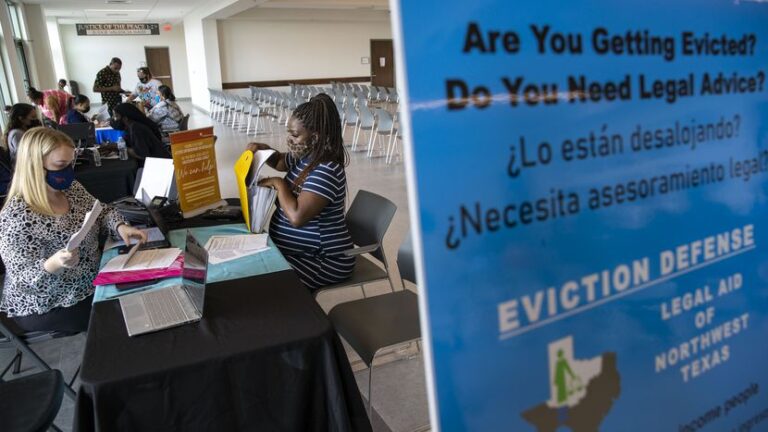A study released in January by the Child Poverty Action Lab found that tenants who have legal representation at their eviction hearing are much more likely to have a favorable outcome.
A Dallas-based nonprofit known as CPAL has released its latest observational study of Dallas eviction courts, based on a 2022 survey. This research reveals how important tenant hearing attendance and legal representation are to sentencing outcomes.
Sixteen SMU Dedman School of Law students heard 1,277 cases before five justices of the peace in Dallas County from November 2022 to April 2023. This represents 10.1% of all hearings originally scheduled.
During this period, more than 18,485 eviction filings were filed in Dallas County, for an average of 108.7 per day. This represents a 3.2% change compared to the same period in 2022 and a 117.5% change compared to the same period in 2021, according to the study.
The analysis found that judges ruled in favor of landlords in 57% of observed cases and in favor of tenants in only 5%. According to the study, lawsuits were dismissed 21% of the time, and 8% of the time the lawsuits were reduced or rent was reduced or suspended.
The odds in the tenant's favor increased when the tenant appeared or when the tenant had legal representation.
According to the study, landlords won in 67% of cases when the tenant was absent, compared to 53% when the tenant appeared at the hearing.
“We've found that once the tenants show up, the outcomes are better,” said Ashley Flores, director of housing at CPAL. “Outcomes are better when tenants have legal representation. This is pretty consistent and what you would expect based on the research we know nationally.”
According to the study, landlords have a 7% chance of winning an eviction judgment if the tenant has legal representation, compared to a 69% chance of winning an eviction judgment if the tenant appears in court without representation. I knew I would win.
Only 25% of tenants in the observed hearings had legal representation, a significant increase from 10% in the 2022 survey. Flores said the study found that the impact of tenant legal assistance was reflected in the diversity of case outcomes.
Influence of legal representation
Flores said most tenants facing eviction are first-time evictions and lack experience with the court process or knowledge of the law.
Farwa Raza, a supervising attorney with Legal Aid Northwest Texas, said that after a landlord files a lawsuit, judges often consider their own list of questions, and in the absence of representation, the tenant must defend itself as best it can. He said he had no choice but to do so.
“In many cases, that leads to a verdict against the defendant,” Raza said. “People don't know much about legal defense.”
Juan Pablo Garnum, communications and policy engagement manager at the Eviction Lab, said there is no comprehensive national data set that allows comparisons with other counties' eviction results.
Eviction Lab is a team of Princeton University researchers, students, and website designers who believe that stable and affordable housing is central to human prosperity and economic mobility, according to the institute's website. I believe there is.
Garnham said it's common sense that tenants will get a better outcome if a lawyer is present, including having the expertise to negotiate better terms with landlords.
“We've seen reports and anecdotes that show that these legal aid services end up balancing what can often be quite an imbalanced situation,” Garnham said. said.
One legal defense is whether the tenant received proper notice. Observers observed that tenants were provided with an eviction notice in 44% of eviction cases.
An eviction notice is a legally required written document that a landlord must give a tenant at least three days before filing for eviction.
The challenge with increasing documentation of notices is that tenants don't show up at eviction hearings, Flores said.
“Judges typically enter automatic default judgments in favor of landlords without discussing the facts of the case at all,” Flores said. “If you have a case where a tenant doesn't show up, you probably won't be asked any questions.”
Impact of eviction
According to CPAL research, landlords appear in 86% of eviction hearings, while tenants appear in only 40% of cases, likely due to tenants' transportation, child care, release from work, etc. It was discovered by observers.
“If you have an hourly job, it's a decision to some extent: 'Do I take a few hours off work to attend a hearing and lose pay, or do I continue to work because I think there's a problem?' Were you postponing the conclusion? ” Flores said. “There’s a kind of decision-making calculus at work.”
According to CPAL and the Eviction Lab, which examines eviction data across the country, once low-income renters are evicted, they are at increased risk of homelessness, more emergency room visits, shorter life expectancies, and more. They say they often face lasting and harmful consequences.
According to CPAL, an eviction filing record can negatively impact future housing searches, even if the tenant ultimately wins, and can negatively impact a tenant's credit score if rent or fees go to collections. There is a possibility that it will be given.
Data from CPAL and the Eviction Institute shows that evictions disproportionately impact communities of color, and mothers of children are the most likely to have an adverse ruling against them.

